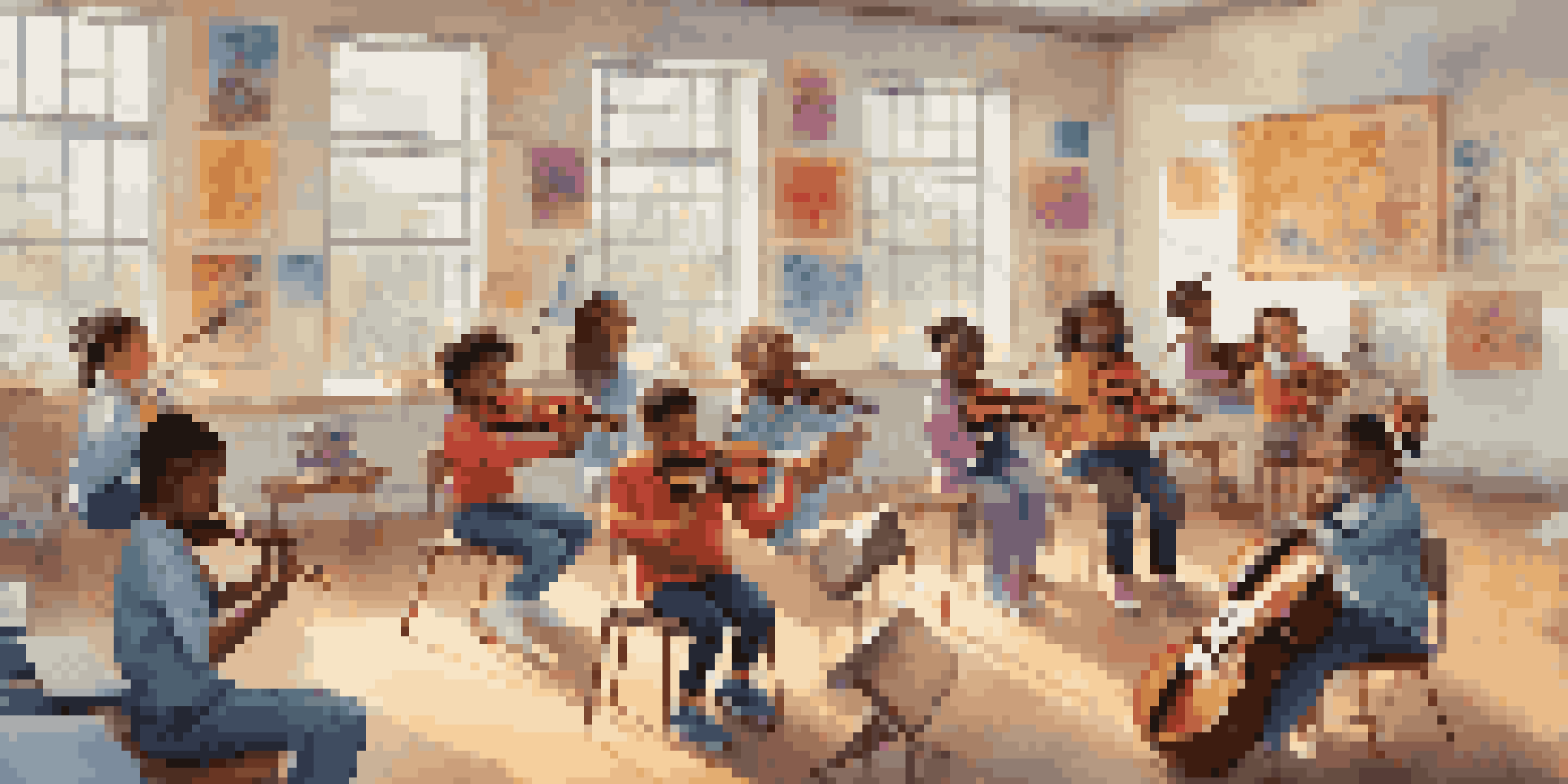Exploring the Importance of Music in the Curriculum

Understanding the Role of Music in Education
Music education plays a crucial role in fostering creativity and self-expression among students. It serves as a unique medium through which children can explore their emotions and thoughts. By integrating music into the curriculum, educators can provide students with diverse ways to communicate and connect with the world around them.
Music can change the world because it can change people.
Moreover, music helps in developing essential skills such as discipline, perseverance, and teamwork. Learning to play an instrument or participate in a choir requires dedication and collaboration, which are valuable life skills. These experiences not only enrich the students’ educational journey but also prepare them for future challenges.
Ultimately, music education is not just about learning notes and rhythms; it’s about nurturing well-rounded individuals. The skills gained through musical training can translate into other academic areas, enhancing overall performance and fostering a love for learning.
Cognitive Benefits of Music Education
Research indicates that music education can significantly enhance cognitive abilities. For instance, studies have shown that students who engage in music training often outperform their peers in subjects like math and reading. This improvement can be attributed to the complex nature of music, which requires critical thinking and problem-solving skills.

Music also influences brain development, particularly in young learners. It stimulates areas of the brain associated with language, reasoning, and even emotional processing. This neurodevelopmental impact suggests that incorporating music into the curriculum can foster a more holistic approach to education.
Music Boosts Cognitive Skills
Engaging in music education enhances critical thinking and problem-solving abilities, leading to better performance in subjects like math and reading.
Furthermore, the cognitive benefits don’t stop with music alone. The skills students acquire through music education, such as pattern recognition and memory enhancement, can be applied across various subjects, making learning more integrated and effective.
Emotional and Social Development Through Music
Music offers students a unique avenue for emotional expression, which is vital during their formative years. It allows them to articulate feelings they may struggle to communicate verbally. This emotional outlet can lead to improved mental health and well-being, providing a safe space for students to explore their identities.
The man who does not have music in himself, nor is stirred with the concord of sweet sounds, is fit for treasons, stratagems, and spoils.
In addition to emotional benefits, music fosters social skills. Participating in group activities like band or choir encourages collaboration, communication, and respect for others. These experiences help students build relationships and develop a sense of belonging, which is crucial for their overall development.
Thus, music education not only nurtures individual emotional growth but also cultivates a supportive community, reinforcing the idea that education is a shared journey.
Enhancing Creativity and Critical Thinking
Creativity is often seen as a vital skill in the 21st century, and music education is one of the best ways to cultivate it. Through composing, improvising, and interpreting music, students engage in creative thinking that can be applied in various aspects of their lives. This creative mindset encourages innovation and adaptability, qualities that are increasingly essential in today’s fast-paced world.
Moreover, music challenges students to think critically. Analyzing musical compositions or understanding different genres requires them to make connections and draw conclusions. This process not only enhances their analytical skills but also encourages them to approach problems from multiple perspectives.
Emotional Growth Through Music
Music provides students with a unique outlet for emotional expression, promoting mental well-being and fostering social connections.
Incorporating music into the curriculum thus serves as a powerful tool for fostering both creativity and critical thinking, equipping students with skills that are invaluable in their academic and personal lives.
Fostering Cultural Awareness and Appreciation
Music is a universal language that transcends cultural barriers, making it an effective way to foster cultural awareness. By studying music from various cultures, students can gain insights into different traditions and histories. This exposure broadens their perspectives and encourages appreciation for diversity, promoting inclusivity within the classroom.
In addition, understanding the cultural context of music enhances students' respect for global traditions. This appreciation can lead to a more harmonious learning environment where students celebrate differences rather than view them as obstacles. It teaches them the importance of empathy and understanding in a multicultural world.
Thus, integrating music education into the curriculum not only enriches students’ learning experiences but also prepares them to be more globally minded citizens.
The Impact of Music on Academic Performance
The correlation between music education and academic performance is well-documented. Students involved in music programs often show higher grades, better attendance, and increased engagement in school activities. This can be attributed to the discipline and focus that music training instills, which translates into improved study habits.
Furthermore, music education can enhance memory retention, making it easier for students to absorb information across subjects. Techniques learned in music, such as auditory processing and pattern recognition, can aid in studying for tests or understanding complex concepts in areas like math and science.
Cultural Awareness via Music
Studying music from diverse cultures encourages appreciation for diversity and empathy, preparing students to thrive in a multicultural world.
Therefore, by emphasizing music in the curriculum, educators can create an environment that not only values creativity but also drives academic success.
Challenges and Solutions in Music Education
Despite its importance, music education often faces challenges such as budget cuts and lack of resources. Many schools prioritize core subjects, leading to the neglect of arts programs. This trend can result in a diminished capacity for students to experience the benefits of music education.
However, there are creative solutions to these challenges. Schools can seek partnerships with local music organizations, apply for grants, or host fundraising events to support their music programs. Engaging the community can also raise awareness about the significance of music education, fostering a supportive environment for its growth.

By addressing these challenges, we can ensure that music education remains an integral part of the curriculum, allowing students to thrive in a well-rounded educational experience.